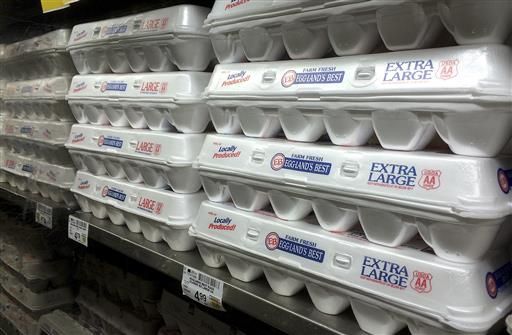PHOENIX — What’s the difference between a Grade A egg and one that’s labeled Grade AA?
Pretty soon it could be as much as three weeks.
The state Senate gave final approval this week to legislation that allows Grade A eggs to remain available for sale for up to 45 days after they were packed. That’s nearly twice as long as currently permitted.
In fact, the cartons for these eggs won’t use terms like “sell by” or “buy thru” — the language in the current law. Instead they will be marked “best by” or “use by.”
Consumers who want to be guaranteed something fresher will have to purchase Grade AA eggs. The compromise on what is HB 2464 leaves the current 24-day sell-by requirement in place for them.
But as it turns out, there’s a good chance if you’re buying jumbo eggs you won’t be able to find them in Grade AA cartons.
All of that goes to the question of what to buy.
“The main difference is the freshness of the egg,” explained Roland Mader, the dairy and egg specialist at the state Department of Agriculture.
There’s nothing wrong with a Grade A egg for many purposes, he said. And, kept properly refrigerated, there is no health reason why not to use one 45 days after packing.
But Mader said there are times when nothing but a Grade AA egg will do.
Some of it, he said, is strictly aesthetic.
You like your eggs sunny-side up?
“If you crack an egg, and it is a Grade AA egg, the egg yolk stands much higher and the egg white is firmer than a Grade A egg,” Mader explained. For a Grade A, think of a less pronounced yolk and more watery white.
Ditto on using Grade AA eggs when you’re poaching them.
Still, he said, there are times when there are legitimate culinary reasons beyond appearance that someone might want a Grade AA egg.
“If you bake a cake and you want the dough to rise better, a fresher egg tends to be better to use,” Mader said.
All that will become more important if the legislation, awaiting final House approval and a gubernatorial signature, becomes law.
What’s behind all this is a desire by retailers to stop throwing away eggs. And that, in turn, goes to consumer attitudes.
Put simply, Michelle Ahlmer, lobbyist for the Arizona Retailers Association, said shoppers check out the expiration date printed on the edge of each carton. And if the date printed on the eggs in the front of the display is within several days, they’re more likely to reach further back and get something with a later expiration date.
But what that does, Ahlmer said, is leave grocers with dozens and dozens of eggs that can’t be sold after the expiration date and can’t even be given away to food banks.
“So we wind up throwing it out,” she said, estimating that retailers toss about $3 million worth of eggs a year.
Her original proposal would have allowed all eggs to remain on sale for 45 days after packaging.
That, however, drew protests from Glenn Hickman who runs the Arizona egg ranch that bears his family name. He said that after the 24th day the eggs just don’t meet that Grade AA standard of that firm yolk and egg white.
So that lead to the deal to allow retailers to sell eggs packed as Grade A and keep them on the shelves longer.





